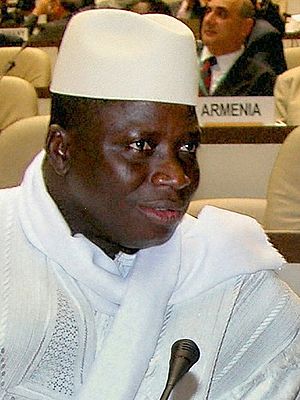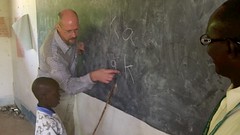 |
Gambia President Yahya Jammeh is currently overseeing a dwindling national currency (Photo credit: Wikipedia) |
It is fully funded by The Gambia Government, an initiative welcomed by the International Monetary Fund, IMF, which had expected the Assembly’s approval of the supplementary budget in April.
The process has since become a routine of the Government to ask for additional money on top of the already approved national budget. Some of the funding comes from loans or from the Consolidated Revenue Fund, the government’s main bank account into which all fees, taxes and revenues of the government, including court fines among others are paid.
But, this time, the Government is funding the proposed supplementary budget by itself. The June 24, 2013 additional budget approval by the NA is the 4th of its kind in the last four years.
In September last year, The Gambia Government claimed it under budgeted its 2012 fiscal year and requested for the NA to support its quest to access an additional funding close to D500 million with less than three months to the end of the year.
That money D470.701, 622 was approved after Finance and Economic Affairs Minister Abdou Kolley argued his Finance Ministry was facing “urgent spending pressures” but warned fellow ministers to “stop unnecessary spending.”
Also in mid 2011, the NA gave a nod to a supplementary appropriation bill of D219, 800, 000 tabled by ex-Finance Minister Mambury Njie – more than 100 per cent the amount it approved in 2010.
In 2009 and 2010 the Government has taken more than D300, 000, 000 and D100, 000, 000, respectively, upon approval by the country’s National Assembly, also known as the Parliament or Legislature.
 |
| Observers say authorities presiding over the economy must learn how to address this "financial crisis" - In this photo a Teacher Helps Student in The Gambia Learn Letters (Photo credit: GlobalPartnership for Education) |
A World Bank report published in 2012 said “the debt forgiveness grant for the country was last reported at US $1, 330, 000 in 2010”.
Currently, the national currency (the Dalasi) continues to loss value against major foreign currencies like the US Dollar, the British Pound and the Euro – a trend that has been going on for the past year.
“As recent as May 2013, it depreciated against the British Pound by 12.62 per cent, the US dollar by 11.87 per cent and the Euro by 12 per cent,” according to the economic think tank, the IMF.
Amid rising inflation, the Central Bank of The Gambia (CBG) on Friday suspended three foreign exchange bureaus – Ria, Money Express, and Wari. The suspension of the three money transfer operators (MTOs) began on June 21, 2013 – until further notice.
A VERSION OF THIS ENTRY FIRST APPEARED HERE ON JUNE 25
Written by Modou S. Joof
Follow on Facebook: The-North-Bank-Evening-Standard











No comments:
Post a Comment
The views expressed in this section are the authors' own. It does not represent The North Bank Evening Standard (TNBES)'s editorial policy. Also, TNBES is not responsible for content on external links.